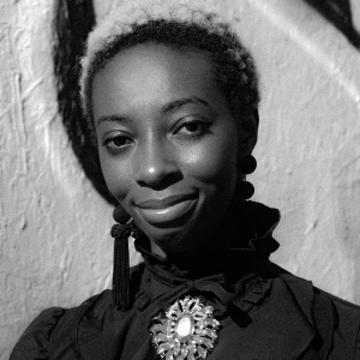Theophina Gabriel, founder of onyx magazine

My name is Theophina Gabriel and I am the Editor-in-Chief at onyx magazine; an independent publication dedicated to publishing talented Black creatives (writers, artists and poets). We are a previously fully-volunteer-led CIC and our team size has varied over the years between 4 and 20.
What is your background? What made you decide to get involved in supporting entrepreneurs?
My background is a working-class creative who has always been surrounded by a talented community marginalised by the mainstream industry. I didn’t make an active decision to become an entrepreneur. I was more focused on realising a space where there wasn’t one and so profit wasn’t (and isn’t) the objective.
This is reflected by our decision to register the magazine as a CIC company. The vision for onyx has always been an authentic space where Black creatives can thrive unrestricted and unhindered by the usual obstacles faced within creative industries. I still don’t see myself as an entrepreneur, I feel more like a collaborator-orchestrator within the team. I do generate a lot of ideas and vision in terms of direction but as a team, we work non-hierarchically and so we strive towards collaborative leadership more than anything, which I feel is a real strength.

I don’t really feel the need to redefine entrepreneurship from its existing definition in order to make it more personal. My role and relation to the magazine is definitely one that feels familial rather than entrepreneurial. Due to the love for the space and intimacy required to edit personal art pieces, there is a real framework of belonging and connection that exists without the publication and it is continuously defined by everyone that has shaped it.
How and when did you know your idea was good enough to develop it?
I didn’t really consider the fact that it wasn’t good enough, I’ve always had an inclination into how stunning Black creativity is. Risk strategisation like this never really came into my purview. It was more of an, how can we champion this and help it reach its full and unrestricted potential rather than questions around value and worth.
What would you say are the top 3 skills that needed to be a successful entrepreneur? Why?
I can’t answer for entrepreneurship because it’s not something I identify with but for a successful vision, I’d recommend being able to communicate the power of your concept. My ability to articulate what I was conceptualising allowed me to attract a wonderful small team of 2-3 people in the beginning who were able to understand the importance of the vision as much as I could see it and they became just as dedicated to realising it.
You won’t always have the drive or the energy to be able to manage tasks and plan things and it’s important not to build alone if you can help it. I would say having a skill set that includes a patient sense of perseverance, a sort of dogged persistence; a sort of clinging-on mentality. This is because starting is easy, seeing things through to fruition is so much harder. A gentle and unshifting persistence no matter the setbacks has aided me through a lot of my journey with the magazine, again this is compounded when you have a good team around you.
Finally, I would recommend having a creative and strategic approach to problem-solving. This is something that I feel is very innate to me. I love looking for creative solutions, but this skill is more powerful when amplified within a team that understands the strengths and weaknesses of any given problem and situation.
What is your favourite part of being an entrepreneur?
My favourite part of being Editor-In-Chief is always seeing people’s reactions to the work inside the magazine and the admiration of its print quality. We take a lot of pride in ensuring the print quality reflects the beauty of the writing and art inside the pages.
What individual, company or organization inspires you most? Why?
MAIA. They are a wonderful community structure that is platforming some of the most forward-thinking programmes in terms of Black creativity in the UK. Their prompts and vision always leave so much room for the Black creatives they work with to actualise some really incredible work and concepts.
If you had 5 minutes with the above individual/ company/organization, what would you want to ask or discuss?
We have regular meetings and we often discuss how organisations focused on communities can support and collaborate with each other in ways that feel authentic and natural. We also discuss infrastructural roadblocks and exchange encouragement and advice.
What has been your most satisfying or successful moment in business?
Unboxing the first edition of the magazine, I cried.
What would you say have been some of your mistakes, failures or lessons learned as an entrepreneur?
Scaling too quickly was a mistake I made as Editor-In-Chief. Larger teams bring on more managerial work and don’t necessarily increase the pace of projects.
How have you funded your ideas?
Through geographical proximity to academic institutions and also through a patron sponsorship base and grant funding.
Are there any sector-specific awards/grants/competitions that have helped you?
Oxford Hub, Baobab and Creative Sector Grant Awards.
n/a
If a new entrepreneur or startup came to you looking for entrepreneurship resources, where would you send them?
Oxford Hub is supporting really great community projects run by social enterprises and helped us get our second edition launched and off the ground.
Any last words of advice?
If it feels too heavy to carry alone, it is. A team is absolutely crucial. Slower is better, don’t rush for growth or a pace you can’t sustain.
Share this
More news



